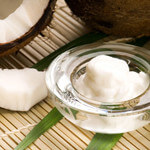Table of Contents
It is impossible to understate the importance of water. This odorless, colorless liquid, which covers two-thirds of the Earth’s surface and comprises 75% of the human body, is absolutely necessary for all life. Indeed, out of all the nutrients we require in our diet, water is – by far – the one we need the most in terms of volume.
Despite its importance, however, several of the questions surrounding water – how much of it we need to drink daily, what type is healthiest – often have conflicting answers.
Frankly, it can be a downright tedious subject to research.
So, in this article, I’d like to set the record straight about water using good old fashioned research and logic. Let’s begin, however, with the basics: What are the health benefits of drinking water?
As it happens, more than we probably imagine.
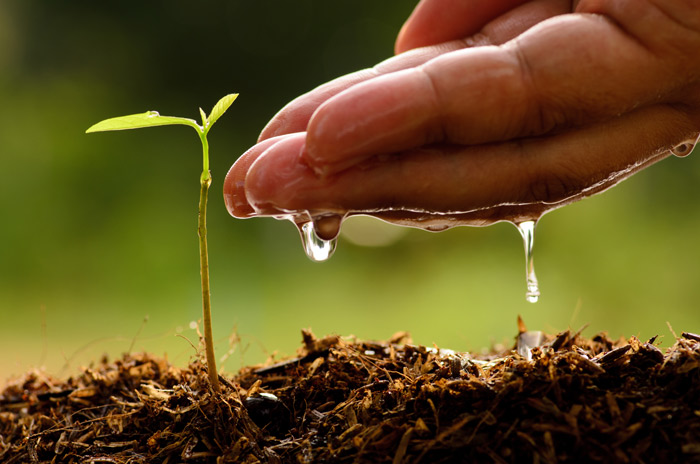
All organisms on Earth need water to survive
Research into the Health Benefits of Water
Maintains Cognitive Function
Since water plays an important role in every biological process in the body, it shouldn’t surprise us that it also aids neurological processes. What might surprise us, however, is the close link between sufficient water consumption and mental performance in all its expressions – including memory.
For example, check out what the following studies discovered:
Put simply, inadequate fluid intake negatively affects the cognitive function of all groups in society. Men, women, children, young adults, old adults, people living in a cold climate, people living in a hot climate… everyone benefits mentally from drinking enough water. It’s that simple.
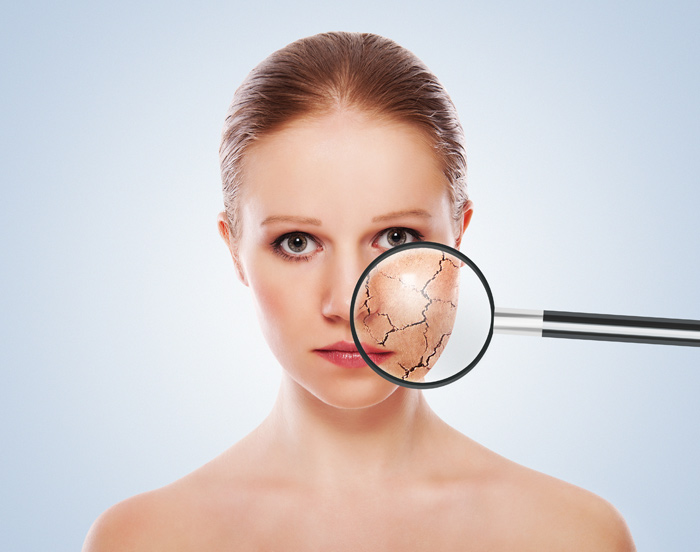
Like all external organs, our skin reflects our inner health (or lack thereof)
Did you know?
The relationship between water and cognition explains why dehydrated individuals often suffer from headaches… or that drinking more water can, in some cases, decrease the duration and intensity of existing headaches. There isn’t too much research into this subject, unfortunately, and certain types of headaches (especially migraines) can be triggered by causes unrelated to water intake.
Nonetheless, increasing our water intake is an important first step towards avoiding the most common type of headache – the kind that we get 95% of the time. And that’s good enough for me.
Improves Physical Performance
Are you more fatigued than usual during and after exercise? Does your body take longer than expected to recover from cardio and weight-related exercise? If so, you might be suffering from insufficient water intake.
I know it can be difficult to remain hydrated during exercise, especially if we’re distracted with music or television (gyms love TVs, don’t they?). Unfortunately, we’re just going to have to train ourselves to do it. If you partake in high-intensity interval training, for example, sip water after every intense training period. Weight training? Drink some water after each set of reps.
Over time, regular water sipping during exercise will become second nature.

Our hunter-gatherer ancestors, who often roamed the grasslands for days in search of game, needed to drink water often to remain energized and healthy
Supports Weight Loss
Most people know that a diet rich in natural, whole foods is the key to long-term weight loss. That said, it’s easy to forget that “diet” refers to both fluids and solids… and that an increased intake of the former can do wonders for the metabolism of the latter.
The researchers also found that the metabolism boost began within 10 minutes of water consumption, and peaked after 30-40 minutes. Therefore, drinking water around 30 minutes before a meal, as many public health experts recommend, is actually a good idea. I know, I was shocked too (about the experts being correct, I mean).
So, there you have it: drinking more water, especially before a meal, aids weight loss. And what could be cheaper and easier to do than upping our water intake?
Did you know?
When we don’t have enough water in our bodies, our large intestine is forced to absorb water from our food waste to compensate. The result? Hard stools that are difficult to pass, aka, constipation.
Therefore, people suffering from constipation will greatly benefit from drinking more water. It’s unlikely to be an instant cure, of course (especially if the colon has become too impacted with waste from years of poor nutrition), but it’s certainly an important first step towards treatment.
What Is the Healthiest Water to Drink?
The healthiest water to drink is mineral water from natural springs. Mountain streams, wells, underground reserves… all of them provide the cleanest, purest, most mineral-rich water on the planet. This is the water that nature intended us to drink, and it’s certainly what our Paleolithic ancestors drank.

Recommended
But that isn’t a very helpful response, is it? Most of us don’t live near natural springs and, even if we do, the land is probably privately owned anyway.
So, let’s adjust the question for a modern audience:
What Is the Healthiest Water to Drink That Is Available for Most People?
Okay, now we’re talking.
This is a difficult subject to research, since the results are often skewed by financial interests. How often have you read an article lionizing water filtration systems, only to discover that the website sells the very products they’re promoting? Ever chanced upon a study “proving” that alkalized water is the healthiest, then learned that the study was funded by alkalized water companies?
It ruffles my feathers.
So, let’s take a step back and employ some common sense: If natural springs provide the healthiest and cleanest water, then filtration methods that replicate natural spring water as close as possible will be the best choice for the average person. Right?
Unfortunately, it’s not that simple. Any filtration system aggressive enough to remove all serious contaminants from water – sodium fluoride, heavy metals, hormone residues, etc. – will also be aggressive enough to remove the minerals from it too.
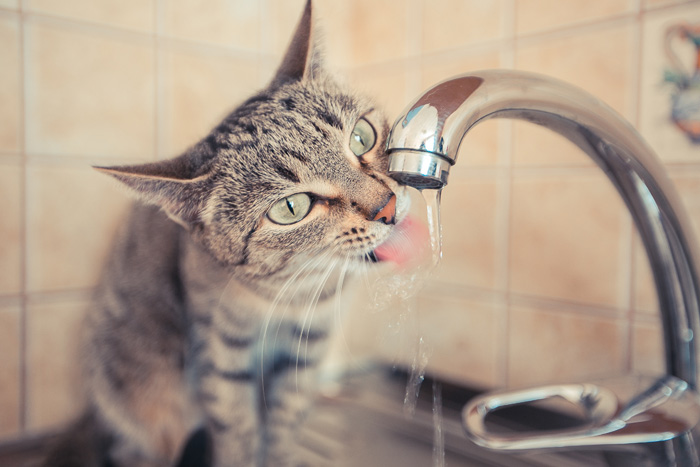
Our ancestors would have probably spat out tap water too
So, what do we do?
Here’s my recommendation: Filter your tap water with a water distiller or reverse osmosis system, then re-mineralize the water with a dash of unrefined sea salt or Himalayan crystal salt. The result is a water that loses its harmful impurities, but retains a robust mineral profile.
It’s not perfect, and it certainly cannot be considered a “natural” process, but it’s the closest the average person can realistically get to clean mineral water on a regular budget.
It’s what I do, anyway.
Not convinced? Non-electrical filtration systems, such as the Berkey Water Filter System, are always an option. Bear in mind, however, that these systems are not as thorough as distillers or reverse osmosis systems when removing contaminants, so lower your expectations accordingly. That said, it’s always wise to have a back-up filtration device in the home that isn’t reliant on the electrical grid.
Did you know?
At first glance, bottled water seems to be a solution to our problems. After all, water products that advertise themselves as “spring water” or “natural mineral water” must be sourced from protected and unpolluted springs, which is exactly what we’re looking for!
Once again, though, things are not that simple. Firstly, most bottled water companies in the West encase their water in polycarbonate plastic, which is made from the notorious, estrogen-mimicking compound Bisphenol-A (BPA). Secondly, bottled water is notoriously bad for the environment. The amount of oil and (ironically) water used to manufacture one bottle of water is staggering – and then, of course, there is the question of where the plastic bottle ends up once it is discarded (spoiler: probably a landfill site).
For these reasons, I cannot – in good conscience – recommend bottled water. It’s just not worth it.
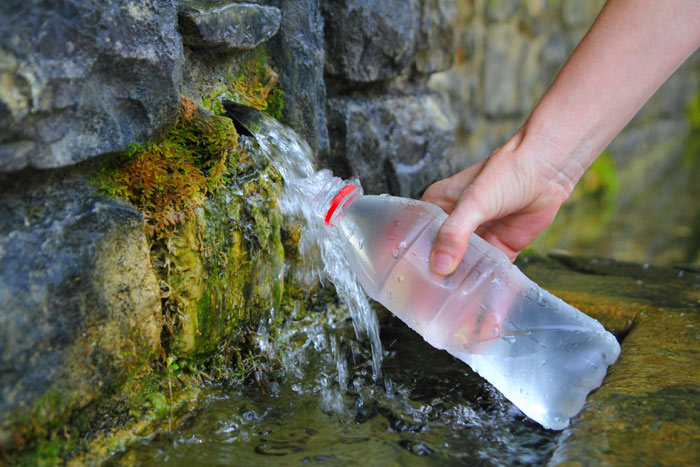
Mineral water in a plastic bottle… what a waste
How Much Water Should We Drink?
According to health experts, we should drink approximately eight 8-ounce glasses of water daily. This advice is misguided, since it overlooks body weight, medical conditions, climate and other relevant factors.
Instead, let your urine be your guide.
If your urine is yellow or dark yellow, drink more water. If your urine is clear, you might have drunk too much water in one go (sipping water throughout the day is preferable to chugging pints of it in one sitting, since our bodies cannot absorb large quantities of water at once). Ideally, aim for light yellow urine throughout the day; this signals optimum hydration. Mornings are the exception, since almost everyone experiences dark yellow urine after the nighttime drought.
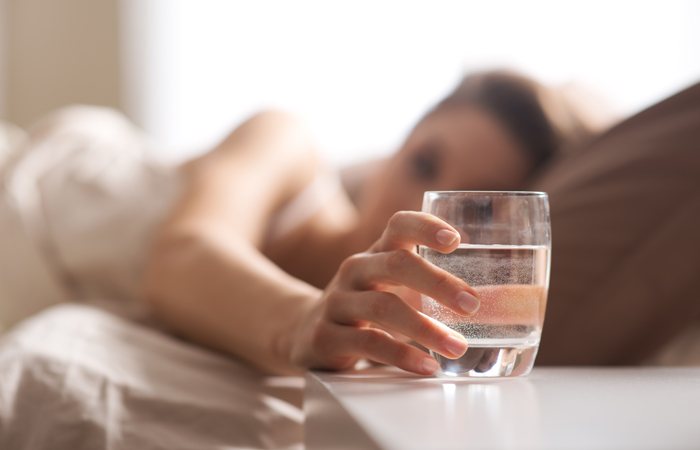
Drinking water upon awakening is essential for good health
Don’t be alarmed if, after increasing your water intake, you begin to urinate frequently to the point of inconvenience. Your body is adjusting to the new and improved amounts of water it is receiving, and usually responds by flushing out excess water that it no longer needs to retain. Things will get back to normal eventually.







